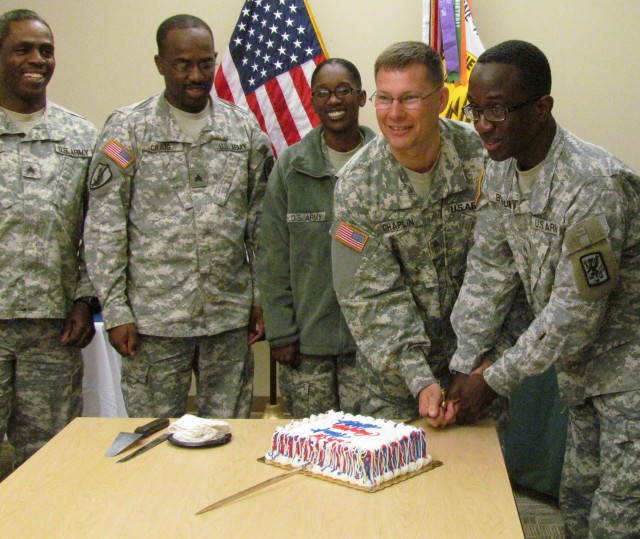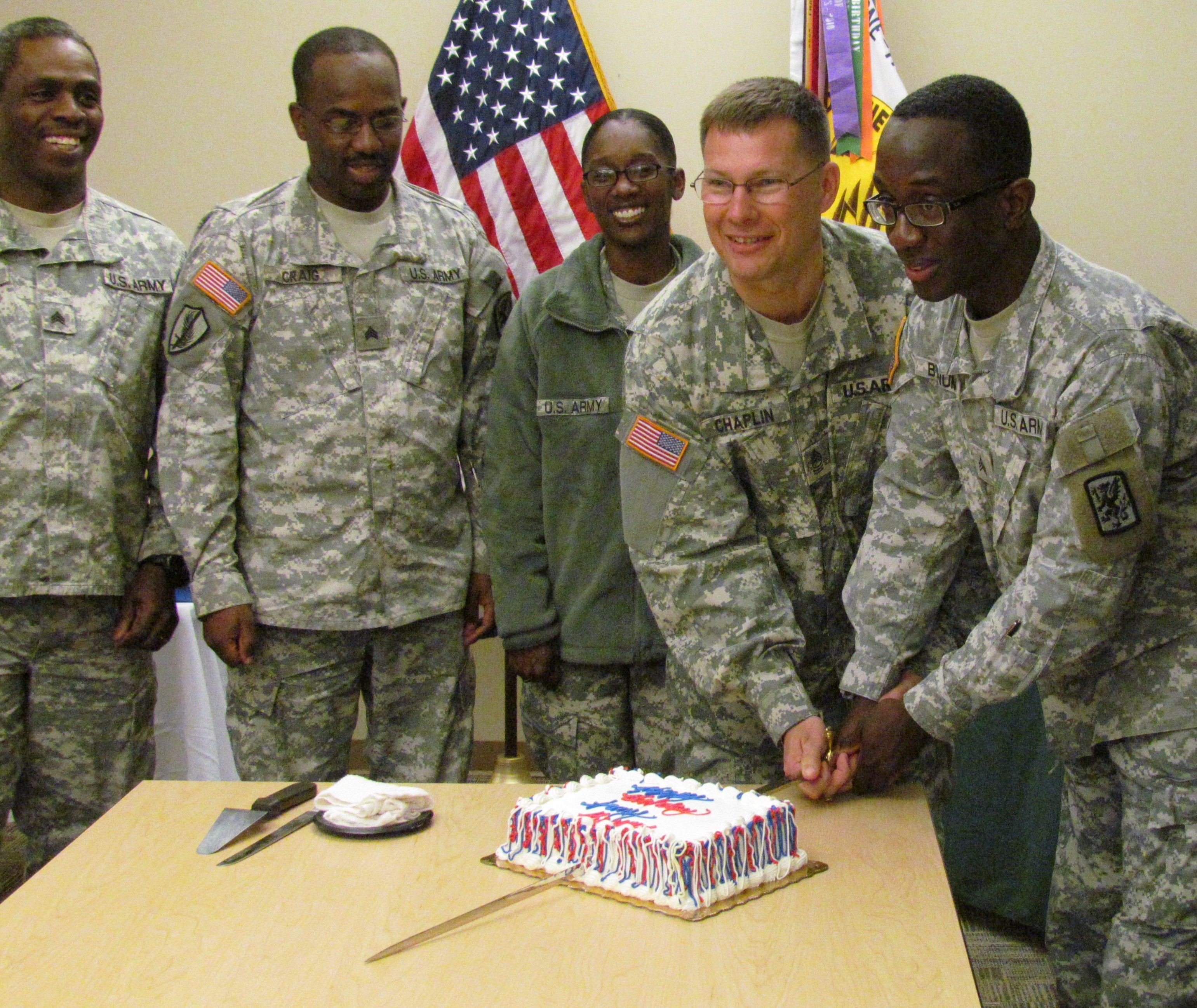
REDSTONE ARSENAL, Ala.--There wasn't a whole lot of age spread between them. But Reserve Master Sgt. Mark Chaplin and Sgt. Jack Bynum were more than happy to represent the oldest and youngest Soldiers at April 15th cake-cutting ceremony for the Army Reserve's 103rd birthday.
Chaplin, who represents the 3rd of the 329th Reserve Training Unit based in Milwaukee, Wis., is 42 and making plans for his upcoming retirement in January. Bynum, a member of the 326th Chemical Company in Huntsville, is 29 and a full-time Reserve Soldier.
Sometimes, the youngest Soldiers available aren't straight out of high school.
"It feels great that I am still the youngest Soldier at some of these events," Bynum said. "In most everything I do, I am the youngest."
Bynum joined Chaplin to cut the Reserve birthday cake at a breakfast gathering at the Lockheed Martin cafeteria in Cummings Research Park. Several reservists, retired reservists, and local community and Association of the U.S. Army leaders attended.
The official 103rd birthday of the Reserves is April 23. The Reserves began in 1908 when Congress created the Medical Reserve Corps, a group of 160 doctors that provided the nation with a reservoir of trained medical professionals for employment in times of national emergency. Today, reservists are specialized in logistics, transportation, training, health care, engineering, information technology, communication networking and law enforcement.
Bynum works in information operations for the 326th Chemical Company. His first three years of service were with the active Army and included a 2003 deployment in support of Operation Iraqi Freedom.
"I still see service as a privilege," he said. "I like being able to balance my career and serving in the military. I live giving back to the community."
Chaplin, an Army Reserve instructor, also expressed the honor of serving his country, and the balancing act required of a reservist.
"It can be challenging sometimes with some of the demands placed on the unit. But the challenge is worth being able to serve," he said.
As a civilian, Chaplin is a communications engineer at Lockheed Martin. He said the quarterly trips to headquarters in Milwaukee and the monthly duty weekends at the Reserve Center on Patton Road or at the Reserve headquarters on Redstone are easy to manage after the numerous deployments he and his family lived through while he was on active duty.
"The first 11 years I was active duty and I deployed five or six times," Chaplin said. "To be gone on weekends ... it's nothing."
Chaplin's active-duty deployments took him to Bosnia and Kosovo, and he went to Korea on an overseas assignment. Now, his civilian job is asking for more of his time, so retirement from the Reserves is a good decision for Chaplin and his family.
"My civilian job is real demanding. It requires a lot of traveling," he said.
For the reservists in the audience, balancing Soldier duties with civilian responsibilities is something they know all too well. Retired Maj. Gen. Paulette Risher, who is now a DigiFlight contractor working in support of the Redstone Test Center, said it is important for advisers, mentors and counselors of young reservists to help them look out beyond the immediate time period to consider their future options both as a Reserve Soldier and as a retiree.
"You will be able to influence people at critical decision points in their lives. And one of those first decisions is to serve or not to serve," Risher said.
The decision to serve is easy for young people, who have not yet involved themselves in marriages, families and careers.
"At that point, it's a pretty straightforward decision. So we join," she said.
The decision to continue service becomes more complex at the five-year and 10-year points as Soldiers marry, have children and are aware of the sacrifices their service requires both of themselves and their families.
"Deciding to stay in uniform or get out becomes harder because more people get a vote," Risher said. "Most every Soldier these days wears a combat action badge. You can turn on the 6 p.m. news and see the impact service has on you, your life and your family."
But for those who continue to serve to or past the required 20 years for retirement, the benefits are well worth it, she said.
For a reservist, retirement paychecks don't start until they turn 60. Risher, who served on active duty and as a reservist during a 34-year career, started receiving her retirement checks in December 2009.
"You do not know what your life is going to look like at the age of 60," she said. "That retirement check gave me enough financial wherewithal to take the risk to open my own consulting business. It allowed me to stay home and take care of my spouse in the final months of his cancer. Today, I wouldn't be able to keep my mortgage without my retirement."
Promotions and training in the Army and Reserves may not translate into much extra money, but they can have a tremendous impact on retirement pay.
"It's not so much how long you serve. It's how well you serve," Risher said. "Help the young people you advise see beyond the immediate."
Quoting poet Robert Frost's poem "The Road Not Taken," Risher urged her audience to "encourage young people to take the right road because the road they choose may make all the difference."
During the breakfast, several local leaders spoke to the reservists in the audience, thanking them for their service.
Steve Taylor, president of the Redstone-Huntsville Chapter of the Association of the U.S. Army, indicated the ribbons on the AUSA chapter flag hung at the event, mentioning the ribbon for Best Chapter in support of Reserve Components.
"(AUSA volunteers) John Perry and Dave Carney have worked so hard to maintain contact with our units and to support our units," Taylor said.
Huntsville Mayor Tommy Battle thanked the reservists for their "top quality line of defense" and the local AUSA "because of day in and day out support of Soldiers that makes Huntsville special."
Although the past 10 years have been tough on the military, Bob Drolet, president of the Third Region AUSA, said active duty and Reserve Soldiers continue to "make the extraordinary look very normal" with the help of supportive families.

Social Sharing